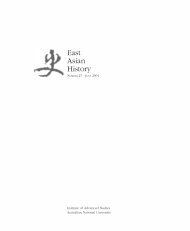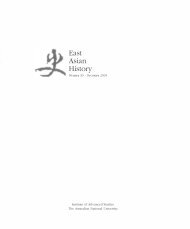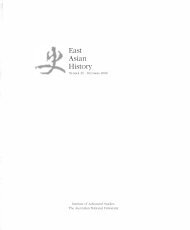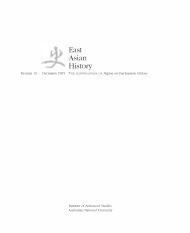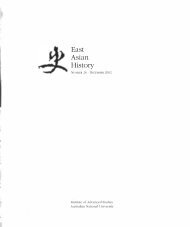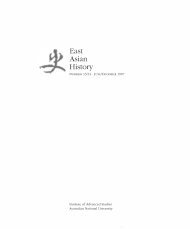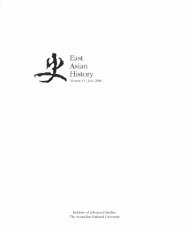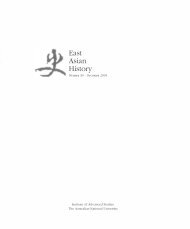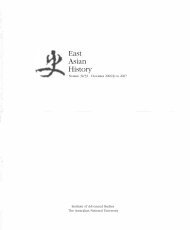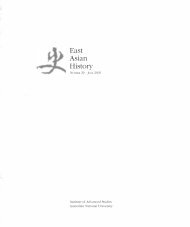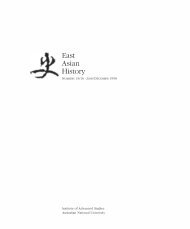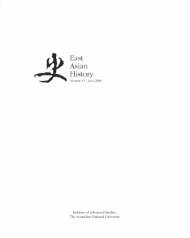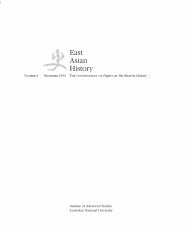Observations from a Film - (Miriam Lang) (PDF ... - East Asian History
Observations from a Film - (Miriam Lang) (PDF ... - East Asian History
Observations from a Film - (Miriam Lang) (PDF ... - East Asian History
- No tags were found...
You also want an ePaper? Increase the reach of your titles
YUMPU automatically turns print PDFs into web optimized ePapers that Google loves.
TRADITIONAL MUSICIANS IN CONTEMPORARY CHINA155A practical illustration of the way in which the composer uses folk sourcesis given in an exchange between Ou Laoshu and a doufu-seller whose salescry he wishes to transcribe for use in his music. The food-seller remarks thatOu Laoshu's music is reminiscent of He Liutang's;21 such familiarity on thepart of the uneducated doufu-vendorwith the Cantonese instrumental musictradition represented by the music of He Liutang suggests strong linksbetween the higher tradition and genuine folk culture. In the precedingscene we saw Ou Laoshu submitting his work to musicians of the folktradition for their approval; here, he is actually collecting a folk 'song' toincorporate into his compositions. between the higher tradition and genuinefolk culture. In the preceding scene we saw Ou Laoshu submitting his workto musicians of the folk tradition for their approval; here, he is actuallycollecting a folk 'song' to incorporate into his compositions.This same process of intellectuals drawing on folk traditions andincorporating folk elements into their work is still taking place today. ModemChinese composers of serious Western-style 'twentieth-century music' areturning to Chinese traditional music for ideas and inspiration, for something'new'-new, that is, in the context of the Western musical tradition-that canmake their music distinctive, be it melodic ideas or instrumental techniques.22It is chiefly on account of this function as source material forWestern-style music that traditional music attracts attention <strong>from</strong> the worldof Western classical music in China today. Articles in music periodicalsdealing with traditional Chinese music are often concerned with how it canbe adapted into Western-style compositions or how new 'traditional' musicshould be written. A preoccupation with creativity is evident in the Chinesemusical world; the chief function of the past in traditional music still appearsto be to selVe the present as a basis for new compositions, and there appearsto be as yet very little interest in preselVing the past for its own sake.23The woman who declines to sing also deselVes a passing mention. Thenotion that performing is a pastime for the young and attractive is notuncommon in present-day Chinese musical circles; this will be discussed ingreater detail below.21 As noted in n.6 above, He Ilutang (1872-1934) was a real historical figure, both a pipamaster and a composer of Cantonese music(Zhongguo yinyue shilae, p.383).22 Discussion of this phenomenon can befound in Jiang Jing, "The influence of traditionalmusic on professional instrumentalcomposition," and Peter Chang, "Tan Dun'sstring quartet Feng-Ya-Song: some ideologicalissues," both in Journal of the Society for<strong>Asian</strong> Music, vo1.22, no.2, Spring/Summer1991.23 By way of exception, almost the whole ofthe article by Zhou Haihong dted above isan impassioned plea for an end to experimentationand reform in Chinese music andthe adoption of a more preservationist approach.Zhou states that these reforms haveadversely affected the style and content ofChinese music without creating forms thatenjoy public support.Figure 4Ou Laoshu trying to collect the doufusellerssales cry (courtesy of Ronin<strong>Film</strong>s)Part TUX)The next scene of Swan Song takes place in a teahouse, where OuLaoshu is dining and reminiscing with his friends. They talk of the antiJapanese war and exchange stories of famous opera singers. The name ofOu Laoshu's wife comes up in their conversation; she is now a well-knowntraditional opera singer, and the two are divorced. His friends reproach himwith his responsibility for the breaking up of his family. In this scene we areshown further glimpses of Ou Laoshu's character and background. Irresponsible,viceful and bad at handling money, he once associated with the starsof the operatic scene; this connection has ended with his broken marriage.



